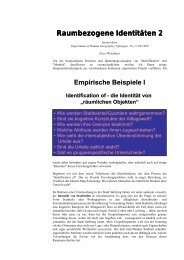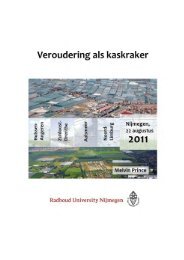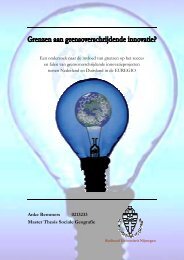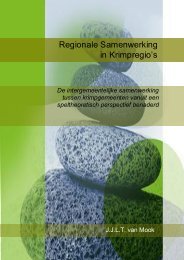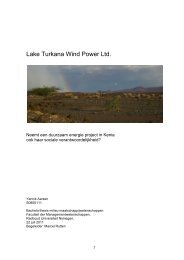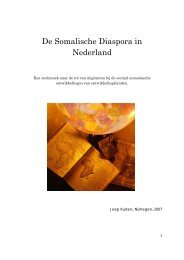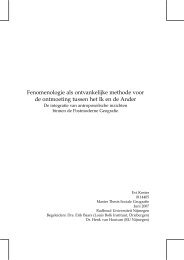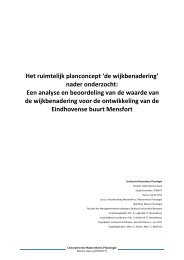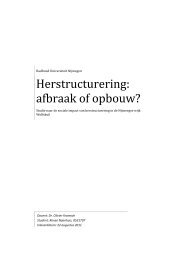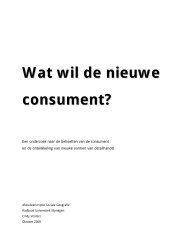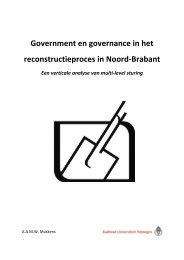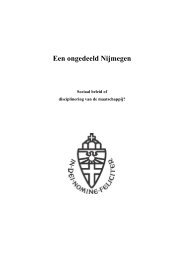Trading with the enemy in Mitrovica, Kosovo. - RUhosting
Trading with the enemy in Mitrovica, Kosovo. - RUhosting
Trading with the enemy in Mitrovica, Kosovo. - RUhosting
Create successful ePaper yourself
Turn your PDF publications into a flip-book with our unique Google optimized e-Paper software.
Miljacka River, separat<strong>in</strong>g <strong>the</strong> Serbian and Muslim parts of <strong>the</strong> city, and conduct a thriv<strong>in</strong>g trade 2<br />
This means that (crim<strong>in</strong>al) Serbs were <strong>in</strong> fact help<strong>in</strong>g Bosniaks w<strong>in</strong>n<strong>in</strong>g <strong>the</strong> war, out of <strong>the</strong>ir own <strong>in</strong>dividual<br />
self <strong>in</strong>terest. It was because of this and o<strong>the</strong>r illegal trad<strong>in</strong>g activities that Sarajevo was able to survive its<br />
three year long siege. As trad<strong>in</strong>g – also <strong>with</strong> o<strong>the</strong>r partners – <strong>in</strong>tensified dur<strong>in</strong>g <strong>the</strong> war <strong>the</strong> Bosniaks were<br />
able to get enough weapons to turn <strong>the</strong> offensive <strong>in</strong> <strong>the</strong>ir favour. Because <strong>the</strong> tables were turned Serbs were<br />
will<strong>in</strong>g to sign a peace agreement <strong>in</strong> 1995 (Andreas, 2004). Even after <strong>the</strong> conflict ended <strong>in</strong>ter-ethnic contact<br />
rema<strong>in</strong>ed very strong <strong>in</strong> <strong>the</strong> smuggl<strong>in</strong>g economy.<br />
“And <strong>in</strong> <strong>the</strong> postwar period, <strong>the</strong> ability to transcend ethnic divisions is nowhere more advanced than <strong>in</strong> <strong>the</strong><br />
thriv<strong>in</strong>g smuggl<strong>in</strong>g economy” (Andreas, 2004).<br />
Dur<strong>in</strong>g <strong>the</strong> conflict crim<strong>in</strong>als and o<strong>the</strong>r people normally at <strong>the</strong> marg<strong>in</strong>s of society where able to ga<strong>the</strong>r<br />
substantial riches enabl<strong>in</strong>g <strong>the</strong>m to become <strong>the</strong> new elite <strong>in</strong> <strong>the</strong> post-conflict society. These people are now<br />
<strong>the</strong> 'crim<strong>in</strong>al elite' and have close ties <strong>with</strong> <strong>the</strong> government and especially nationalist political parties. A large<br />
marketplace on <strong>the</strong> border between <strong>the</strong> federation and <strong>the</strong> Serbian republic <strong>in</strong> Bosnia was left alone by <strong>the</strong><br />
<strong>in</strong>ternational community for quite some time because of <strong>the</strong> huge amount of <strong>in</strong>ter-ethnic contact tak<strong>in</strong>g place<br />
<strong>the</strong>re, despite most of <strong>the</strong> trade be<strong>in</strong>g conducted be<strong>in</strong>g illegal. It was <strong>the</strong> belief of <strong>the</strong> western policy makers<br />
<strong>in</strong> liberal peace that made <strong>the</strong>m th<strong>in</strong>k this <strong>in</strong>ter-ethnic trade would be beneficial, and this is reflected <strong>in</strong> <strong>the</strong>ir<br />
policy. It is questionable though if <strong>the</strong> <strong>in</strong>ter-ethnic contact tak<strong>in</strong>g place at this market did any good, because<br />
<strong>the</strong> place is be<strong>in</strong>g run by hardl<strong>in</strong>e obstructionists who are h<strong>in</strong>der<strong>in</strong>g ethnic <strong>in</strong>tegration (Andreas, 2004).<br />
Andreas (2004) notes <strong>with</strong> good reason that <strong>the</strong> western idea of trade benefit<strong>in</strong>g peace may not be true <strong>in</strong> <strong>the</strong><br />
case of illegal trade, and that this topic requires a deeper understand<strong>in</strong>g.<br />
“While Western officials promote <strong>the</strong> classic liberal argument that peace can be fostered through trade and<br />
economic <strong>in</strong>terdependence, it rema<strong>in</strong>s to be seen whe<strong>the</strong>r durable peace can also come through illegal trade<br />
and clandest<strong>in</strong>e economic <strong>in</strong>terdependence” (Andreas, 2004).<br />
Although <strong>the</strong> conflict <strong>in</strong> <strong>Kosovo</strong> was shorter and less <strong>in</strong>tense than <strong>in</strong> Bosnia-Herzegov<strong>in</strong>a, it will be shown <strong>in</strong><br />
<strong>the</strong> context chapter that both post-conflict situations are comparable on many levels. As especially <strong>in</strong><br />
<strong>Mitrovica</strong> hardl<strong>in</strong>ers and nationalists have become very powerful <strong>in</strong> <strong>the</strong> post-conflict society through<br />
crim<strong>in</strong>al activities and <strong>the</strong>y use this power to protect <strong>the</strong>ir bus<strong>in</strong>ess <strong>in</strong>terests and obstruct ethnic <strong>in</strong>tegration.<br />
2 The New York Times. John. F. Burns. Gangs <strong>in</strong> Sarajevo Worry Diplomats. Published: Monday, October 4, 1993<br />
http://www.nytimes.com/1993/10/04/world/gangs-<strong>in</strong>-sarajevo-worry-diplomats.html?pagewanted=1<br />
visited on 01-09-2009<br />
22



